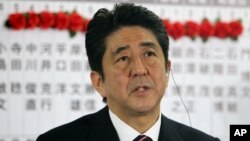BEIJING —
China says it is highly concerned about the direction of Sino-Japanese relations following Sunday's elections in Japan, which will bring a conservative government to power. Relations between the two countries have been strained in recent months over an island dispute in the East China Sea.
China will pay close attention to the actions of incoming prime minister Shinzo Abe after his Liberal Democratic Party won national parliament elections in a landslide in Japan.
Foreign Ministry spokesperson Hua Chuying says Beijing is highly concerned about which direction Japan will take now that the election is over, and is hoping for constructive and peaceful development of ties between the two countries.
The election followed months of rising tensions between the two Asian powers about a chain of islands knows as the Diaoyu in China and Senkakus in Japan.
In September, a standoff over the islands inspired violent anti-Japanese protests throughout China. More recently ships from both countries have been shadowing each other near the islands, and last week a Chinese government airplane entered into what Japan considers its airspace.
During the election Abe stoked nationalist passions calling for a stronger military, and the Liberal Democratic Party says it might construct buildings on the islands, a move that would certainly provoke China.
In a news conference after the election, Abe affirmed again Japan’s ownership of the islands. He said Japan owns and actively controls the Senkaku islands and there is no room to negotiate on this point.
But with a weak Japanese economy and export sector, some analysts say Abe’s provocative statements regarding the islands are merely campaign rhetoric.
Australian Defense Force Academy Professor Carl Thayer says the global recession will force Japan and China to place internal issues at the top of their agenda.
“Both leaders, in particular Abe, have massive domestic problems to look at, particularly with the economy," noted Thayer. "So it is unlikely that they want a foreign policy crisis that would prevent them from dealing with domestic issues.”
But with a general shift to the right in Japan’s political sphere, Abe's stance towards China may be stronger than it was the last time he was prime minister, five years ago.
China will pay close attention to the actions of incoming prime minister Shinzo Abe after his Liberal Democratic Party won national parliament elections in a landslide in Japan.
Foreign Ministry spokesperson Hua Chuying says Beijing is highly concerned about which direction Japan will take now that the election is over, and is hoping for constructive and peaceful development of ties between the two countries.
The election followed months of rising tensions between the two Asian powers about a chain of islands knows as the Diaoyu in China and Senkakus in Japan.
In September, a standoff over the islands inspired violent anti-Japanese protests throughout China. More recently ships from both countries have been shadowing each other near the islands, and last week a Chinese government airplane entered into what Japan considers its airspace.
During the election Abe stoked nationalist passions calling for a stronger military, and the Liberal Democratic Party says it might construct buildings on the islands, a move that would certainly provoke China.
In a news conference after the election, Abe affirmed again Japan’s ownership of the islands. He said Japan owns and actively controls the Senkaku islands and there is no room to negotiate on this point.
But with a weak Japanese economy and export sector, some analysts say Abe’s provocative statements regarding the islands are merely campaign rhetoric.
Australian Defense Force Academy Professor Carl Thayer says the global recession will force Japan and China to place internal issues at the top of their agenda.
“Both leaders, in particular Abe, have massive domestic problems to look at, particularly with the economy," noted Thayer. "So it is unlikely that they want a foreign policy crisis that would prevent them from dealing with domestic issues.”
But with a general shift to the right in Japan’s political sphere, Abe's stance towards China may be stronger than it was the last time he was prime minister, five years ago.




